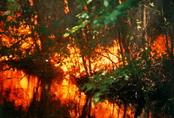
AP Photo/Don Ryan, FILE |
While the federal government tries to dump the costs of wildfires onto local governments, a new study indicates that federal policies have been making things worse:
"It was the conventional wisdom that salvage logging and planting could reduce the risk of high-severity fires," said Jonathan R. Thompson, a doctoral candidate in forest science at Oregon State, who was lead author of the study appearing this week in Proceedings of the National Academy of Sciences. "Our data suggest otherwise."
They suggested that the large stands of closely packed young trees created by replanting are a much more volatile source of fuel for decades to come than the large dead trees that are cut down and hauled away in salvage logging operations.
—Scientists find logging dead trees after wildfire and replanting makes next year’s fire worse, by Jeff Barnard, AP, 11 June 2007
Salvage logging is removing dead trees after a fire. It turns out that doesn’t reduce the risk of fire, and close-packed new-planted trees increase that risk.
Continue reading The New York Times asked:
The New York Times asked:

